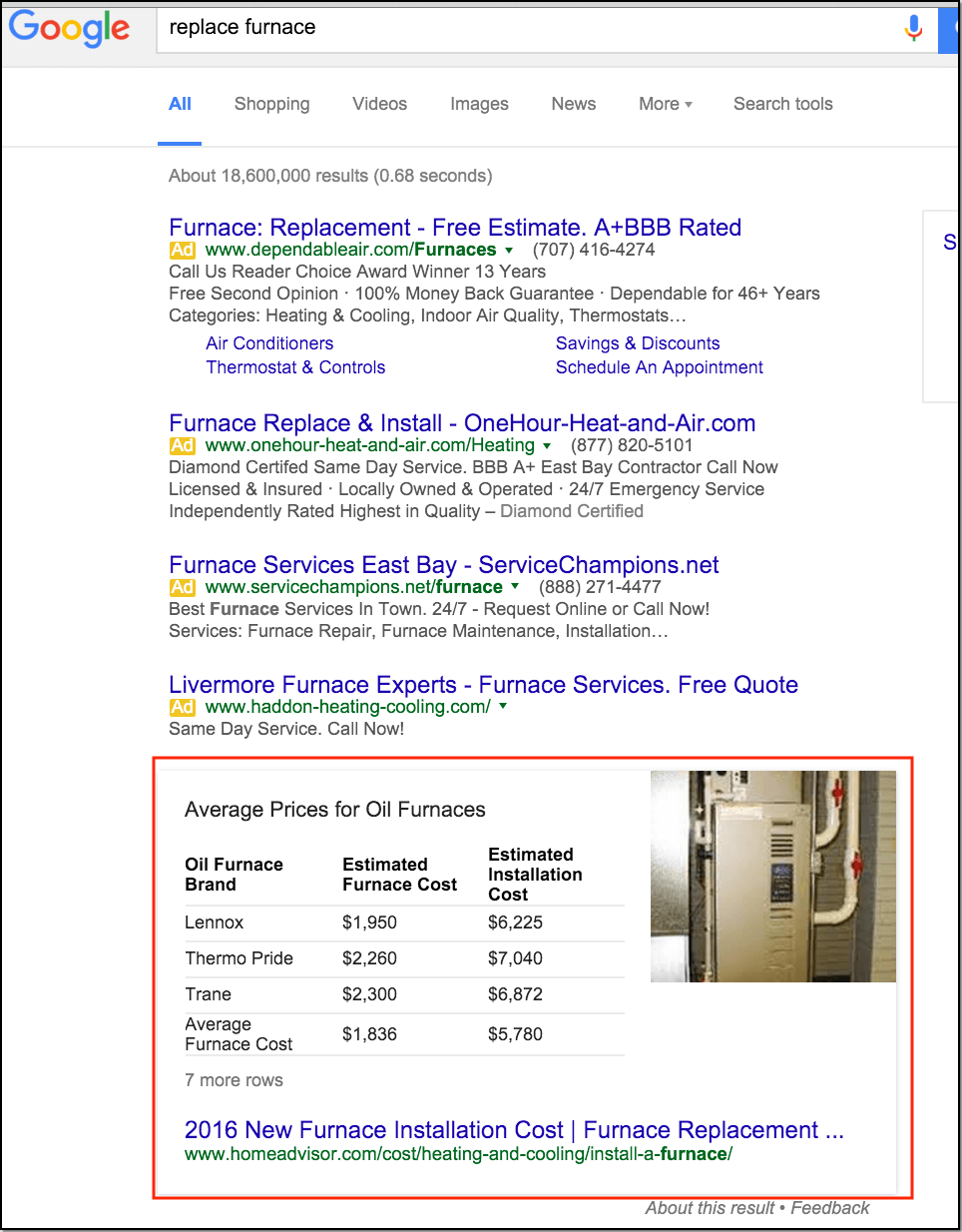Don’t trust Google to structure your local data
As Google increasingly incorporates direct answers and other types of featured snippets into search results pages, columnist Andrew Shotland points out that businesses may want to get smarter about marking up their pages.

I have been noticing a lot of Google Answer Boxes showing up for queries with local intent these days. My recent post, Are You Doing Local Answers SEO? pointed out this fantastic result HomeAdvisor is getting for “replace furnace” queries:

When clients get these local answer boxes, they often perform significantly better than regular #1 organic listings. In our opinion, these seem to be driven primarily by the following factors:
- Domain/page authority
- Text that appears to answer the query
- Easy-to-understand page structures (broken up into sections that target specific queries, tables, prices and so on). Schema is not necessary here, but it helps.
For more of a deep dive on how these work, see Mark Traphagen’s excellent summary of last year’s SMX West panel on The Growth of Answers SEO.
But I am not here to talk about how great answer boxes are. I am here to talk about this result that recently popped up for “university of illinois apartments”:
At first glance, you might think this was a basic list of apartments for rent near the university. But if you look closer at the grid of data, you will see that it looks more like part of a calendar, which is pretty useless.
Many searchers may look past this and just click on the link, but this got me thinking that I really don’t want Google controlling what parts of my site get shown in the SERPs, particularly when it looks more like a Lack of Knowledge Box.
Think about if you had some unsavory user comments on the page that appeared in the answer box. Not only would this be a useless result, but it also might be damaging to your brand. The apartments result might make some searchers think ApartmentFinder is a bad site. So what went wrong here?
If you examine the ApartmentFinder URL in the answer box, you’ll notice that it doesn’t display any calendar in the UI. But if you search the code for “calendar,” you’ll see:
This shows that there is some kind of calendaring app in a contact form.
As you can see from the next screen shot, the first Contact button that appears on the page is fairly close to the h1 that reads, “81 apartments for rent near the University of Illinois”:
And if you click on the Contact button, you get a pop-up form with a calendar:
It seems that Google is:
- assuming the query deserves a more complex list of results than the standard SERP;
- looking for the data closest to the strongest instance of the query text on the page (the h1); and
- taking the first thing that looks like a table of data and putting it on the SERP. (I am sure it’s more complicated than that, but not too sure.)
So what can you do to avoid this?
- Mark up your data with schema.org markup. This should give you the best chance of avoiding Google getting your info wrong. (On that note, the Schema.org site itself is kind of a drag to use. Try Google’s own site on Structured Data. It has all of the schema stuff you’ll need, plus some stuff that isn’t on Schema.org.)
- Make sure the content you want to appear in answer boxes is closest to the on-page text that has the strongest match for the query — often the h1, but this could be a subheading, as well. If possible, make multiple subheadings that target different queries (e.g., “cheap apartments for rent,” “pet friendly apartments,” and so on) that might be the best results. For more on why this might be important, check out Dave Davies’ great take on the recent presentation from SMX West on how Google works by Google’s Paul Haahr. And while you’re at it, Rae Hoffman’s take on it is pretty great, too.
- Put your content in a simple table on the page, or at least make it easy for Google to build its own. The fact that ApartmentFinder doesn’t mark any of its listings on that page with what type of listing it is makes it hard for Google to show a table of, say, one-bedroom apartments for rent at specific prices. Just adding “1BR” in text on each one-bedroom result may be enough to fix the problem.
Figuring out how to impact the answer box displays is akin to what we all went through trying to figure out how to influence what shows up for titles, descriptions and rich snippets. It can take a bit of trial and error, but when it works, it can be the answer to your SEO prayers.
Contributing authors are invited to create content for Search Engine Land and are chosen for their expertise and contribution to the search community. Our contributors work under the oversight of the editorial staff and contributions are checked for quality and relevance to our readers. The opinions they express are their own.
Related stories
New on Search Engine Land



